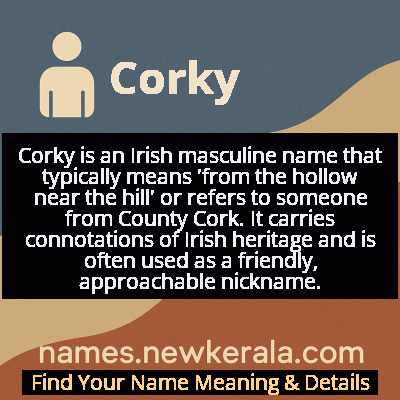Corky Name Meaning & Details
Origin, Popularity, Numerology Analysis & Name Meaning of Corky
Discover the origin, meaning, and cultural significance of the name CORKY. Delve into its historical roots and explore the lasting impact it has had on communities and traditions.
Name
Corky
Gender
Male
Origin
Irish
Lucky Number
9
Meaning of the Name - Corky
Corky is an Irish masculine name that typically means 'from the hollow near the hill' or refers to someone from County Cork. It carries connotations of Irish heritage and is often used as a friendly, approachable nickname.
Corky - Complete Numerology Analysis
Your Numerology Number
Based on Pythagorean Numerology System
Ruling Planet
Mars
Positive Nature
Generous, passionate, energetic, and humanitarian.
Negative Traits
Impulsive, impatient, moody, and can be overly emotional.
Lucky Colours
Red, maroon, scarlet.
Lucky Days
Tuesday.
Lucky Stones
Red coral, garnet.
Harmony Numbers
1, 2, 3, 6.
Best Suited Professions
Military, sports, philanthropy, leadership roles.
What People Like About You
Courage, energy, leadership, generosity.
Famous People Named Corky
Corky Carroll
Professional Surfer
First professional surfer and multiple-time champion
Corky Lee
Photographer and Activist
Documented Asian American communities for over 50 years
Corky Gonzales
Boxer and Civil Rights Activist
Founded the Crusade for Justice organization
Corky Ballas
Professional Dancer
World champion Latin dancer
Name Variations & International Equivalents
Click on blue names to explore their detailed meanings. Gray names with will be available soon.
Cultural & Historical Significance
Throughout the 20th century, the name carried connotations of Irish heritage and working-class authenticity, often associated with communities that maintained strong Irish cultural traditions despite geographical displacement. The name's usage reflects broader patterns of ethnic identity preservation among immigrant groups, serving as both a personal identifier and cultural marker. In contemporary contexts, Corky represents the ongoing negotiation between ancestral heritage and modern identity, embodying the resilience and adaptability characteristic of Irish diaspora experiences worldwide.
Extended Personality Analysis
Individuals named Corky are typically perceived as approachable, energetic, and possessing a natural charisma that draws people to them. They often exhibit a blend of traditional values and modern adaptability, reflecting their Irish cultural roots while navigating contemporary social environments. Corkys tend to be resilient and resourceful, with a strong sense of community and loyalty to family and friends. Their personality often includes a quick wit and storytelling ability, traits commonly associated with Irish cultural traditions.
Many Corkys demonstrate practical problem-solving skills combined with emotional intelligence, making them effective in both personal relationships and professional settings. They typically maintain a positive outlook even in challenging circumstances, embodying the perseverance historically associated with Irish immigrant communities. The name suggests someone who is grounded yet flexible, capable of maintaining core values while adapting to changing situations. This combination of stability and adaptability often makes Corkys valued members of their social and professional circles, known for their reliability and genuine interpersonal connections.
Modern Usage & Popularity
In contemporary times, Corky has transitioned from a formal given name to primarily serving as a nickname or diminutive form. While its popularity as a legal first name has declined since its peak in the mid-20th century, it remains in use within Irish-American communities and families seeking to honor ancestral connections. The name currently experiences more frequent usage as a affectionate nickname for individuals named Corcoran, Cormac, or even unrelated names where the 'Corky' nickname fits personality characteristics. Social Security Administration data shows the name has become relatively uncommon for newborns in recent decades, though it maintains presence through established individuals and cultural references. Modern usage often carries nostalgic or retro connotations, appealing to those appreciating vintage names with strong ethnic heritage while recognizing its diminished frequency in birth registrations.
Symbolic & Spiritual Meanings
Symbolically, Corky represents resilience, adaptability, and cultural continuity. Like cork material that floats and withstands pressure, the name suggests buoyancy in adversity and the ability to preserve one's identity despite external challenges. It embodies the immigrant experience of maintaining cultural roots while adapting to new environments. The name also carries connotations of earthiness and authenticity, connecting to Irish agricultural traditions and the importance of land and community. Metaphorically, Corky symbolizes the bridge between tradition and modernity, honoring ancestral heritage while engaging with contemporary life. The name's informal, friendly quality suggests approachability and genuine connection, representing values of community, storytelling, and emotional authenticity that transcend geographical boundaries and historical circumstances.

